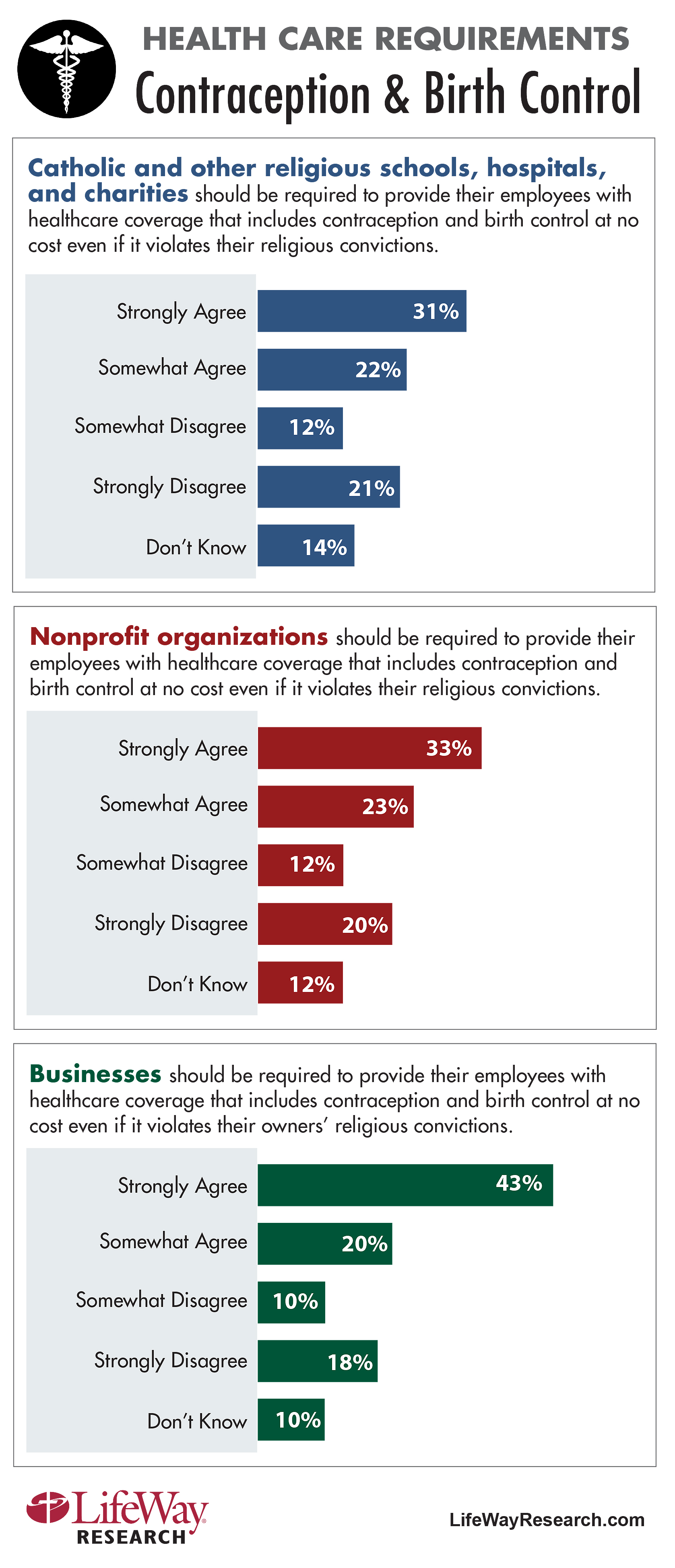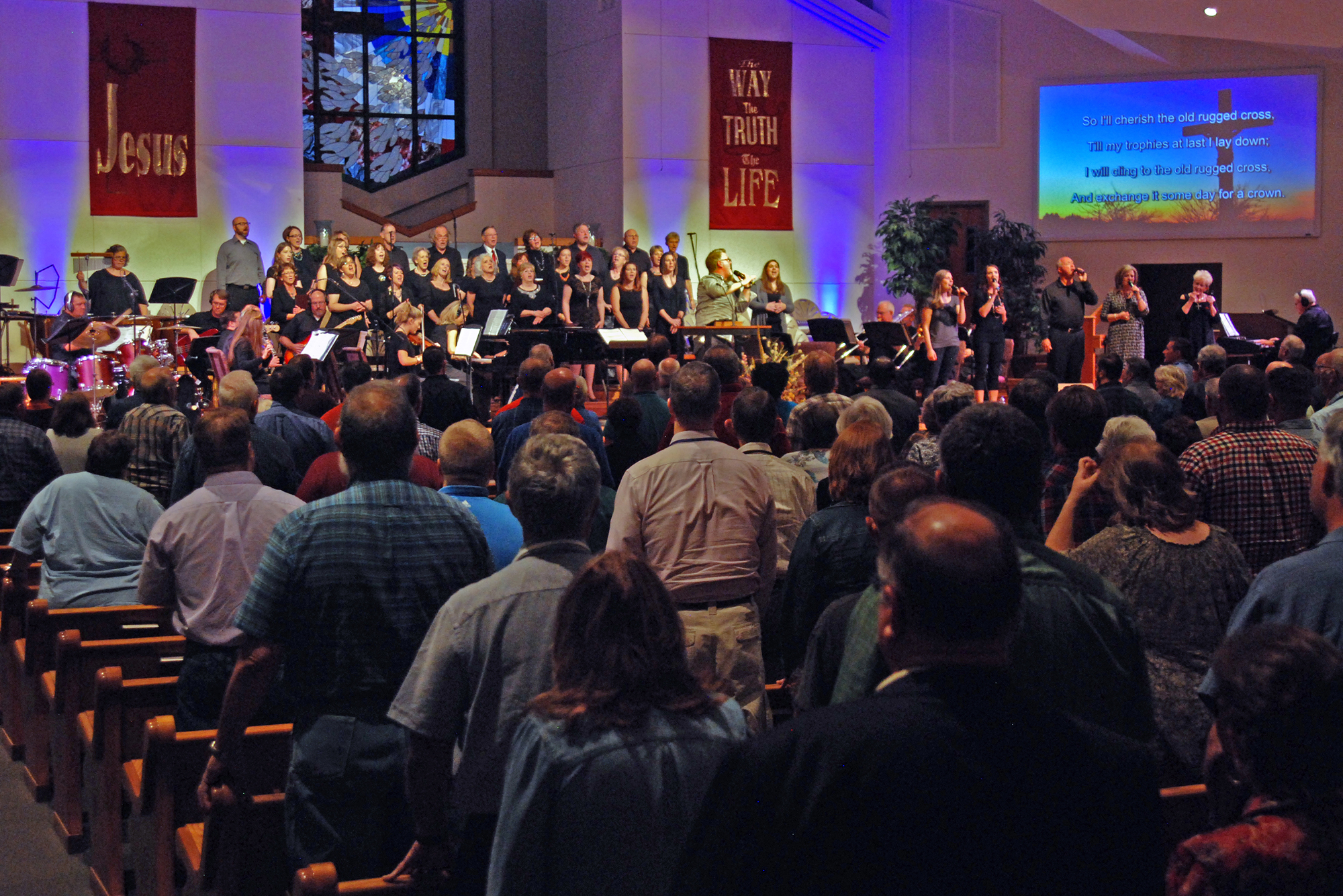
NASHVILLE (BP) — The majority of adults in America believe businesses and organizations, even those with conflicting religious principles, should be required to provide coverage of contraception and birth control for their employees, according to a survey by LifeWay Research.
At issue is a Department of Health and Human Services mandate under the health care law (a.k.a. “ObamaCare”), which requires the coverage, even if it violates the employer’s religious convictions.
About 40 business and religious organizations have filed suit claiming the HHS mandate violates the Constitution under the First Amendment and also conflicts with the federal Religious Freedom Restoration Act.
According to the LifeWay Research survey, nearly two-thirds (63 percent) of American adults agree businesses should be required to provide their employees with free contraception and birth control, even if it runs counter to the owners’ religious principles. Twenty-eight percent disagree and 10 percent selected “Don’t Know.”
The opinions change somewhat when taking into consideration religious affiliation of the organization. Fifty-three percent agree Catholic and other religious schools, hospitals and charities should be required to provide the coverage, while 33 percent disagree.
In considering whether nonprofits should be required to provide the coverage, 56 percent of adults agree and 32 percent disagree they should be required to follow the mandate even if it goes against their religious beliefs.
“It is easy for Americans to desire to protect the freedoms of individuals over unnamed business entities,” said Ed Stetzer, president of LifeWay Research. “However, such generalizations may overlook the fact that more than 90 percent of businesses with employees are family businesses. Recent lawsuits contend that the religious freedoms of these families conflict with healthcare choices desired by individuals.”
Stetzer clarified the wording of the LifeWay Research poll, which asks about “contraception” and not specifically “abortifacient contraception,” a main point in many of the suits. Abortifacient contraception includes “the morning-after pill,” which induces abortion of a fertilized embryo.
“We chose the wording to reflect what is widely reported in the news as a ‘contraception mandate,'” Stetzer said. “Catholic organizations were quick to point out the conflict of the mandate with the religious teachings of the Catholic church, but the details of this mandate concern many other religious groups whose religious beliefs specifically oppose abortifacient contraception. At this point, however, the vast majority of news reports describe this as a contraception issue and the majority of Americans are not supportive of companies, nonprofits or Catholic charities opting out.”
On Nov. 16, a federal court ruled in favor of faith-based Tyndale House Publishers, which filed a lawsuit against the government to halt enforcement of the mandate. But three days later another court ruled against the suit brought by the Christian owners of the Hobby Lobby retail stores, stating the owners’ beliefs were only “indirectly” burdened by the mandate’s requirement that they provide free coverage contraception and birth control in Hobby Lobby’s self-funded insurance plan. Hobby Lobby, which filed an appeal, faces millions of dollars in fines if it does not comply.
Demographically, responses to the LifeWay Research poll show Americans who never attend religious services are more likely to “Strongly Agree” (45 percent) that nonprofits, Catholic and other religious schools, charities and hospitals should be forced to follow the mandate. The percentage rises to 55 percent when considering businesses in general.
The survey shows women are more likely than men to “strongly agree” that all three organizational categories: businesses (48 percent vs. 37 percent); nonprofits (37 percent vs. 29 percent); Catholic and religious schools, hospitals and charities (36 percent vs. 26 percent) should provide the coverage.
Younger Americans are the least likely (less than 10 percent) to “strongly disagree” with businesses and organizations being required to follow the mandate.
“The religious freedom that the United States pioneered is not a freedom of belief, but a freedom to practice that faith,” Stetzer said. “The American public appears unaware or unconcerned that some religious organizations and family businesses indicate fear of losing the freedom to practice their faith under the new health care regulations.”
The survey was conducted online Nov. 14-16 among 1,191 adults.
–30–
Russ Rankin is a writer for the communications office of LifeWay Christian Resources. Get Baptist Press headlines and breaking news on Twitter (@BaptistPress), Facebook (Facebook.com/BaptistPress ) and in your email ( baptistpress.com/SubscribeBP.asp).




















